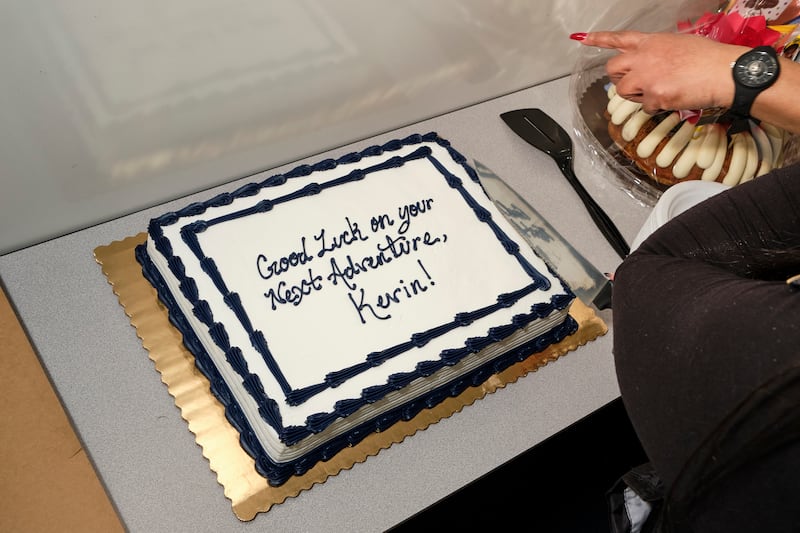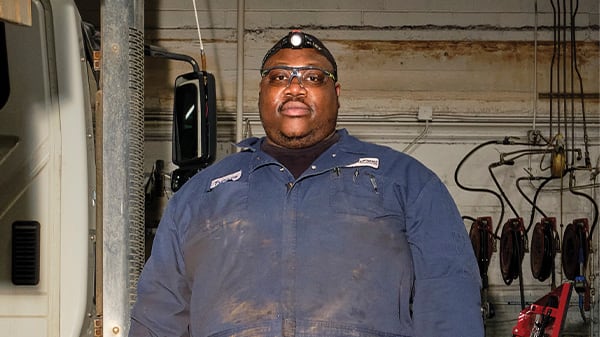Tremayne Bell rises at 4:30 am, tiptoeing downstairs so as not to wake his wife and three kids.
At the bottom of the stairs, he pats Bella the cat, an orange tabby with real Garfield energy. He packs his lunch—plus a snack of nuts, fruit and an energy drink—and slips out the door by no later than 5:15. Getting up this early, Bell says, “never gets easier.”
He arrives at the Kerby Garage in North Portland half an hour later, with 10 minutes to spare before the meeting where bleary-eyed mechanics will hear which of the city of Portland’s 3,800 vehicles they’ll repair that day.
Bell parks his car under Interstate 405, the cars and trucks already whooshing overhead, and makes a harsh 100-step climb up the steeply sloped sidewalk to a side door of the Kerby.
Before dawn, Bell enters perhaps the most dangerous building the city owns.
The Kerby Garage is easy to miss. Standing across from Legacy Emanuel Hospital in North Portland, it’s a featureless two-story building that slopes downward as if it’s sliding off a hill and settling underneath the crisscrossing interchanges of I-405.
In this century-old garage, 2,400 vehicles in the city fleet—sewer suckers, pavers, excavators, deicers, and 12-wheel dump trucks, all unbelievably large—are repaired by the Kerby’s 40 mechanics and welders. These men—and they’re all men—are often wedged underneath the belly of a vehicle 40 times their size. The shop is open 18 hours a day.
The Kerby Garage is in rough shape. Sprinklers cover only a sliver of the garage, and there are no automated smoke detection devices, nor a fire alert system. There’s no air conditioning. It has only two garage doors that frequently break down, so maneuvering vehicles in and out is a painfully slow game of Tetris. The floor slopes violently and unevenly, meaning mechanics can’t jack up their vehicles to make space underneath, instead crawling on their backs to work on a vehicle’s undercarriage.
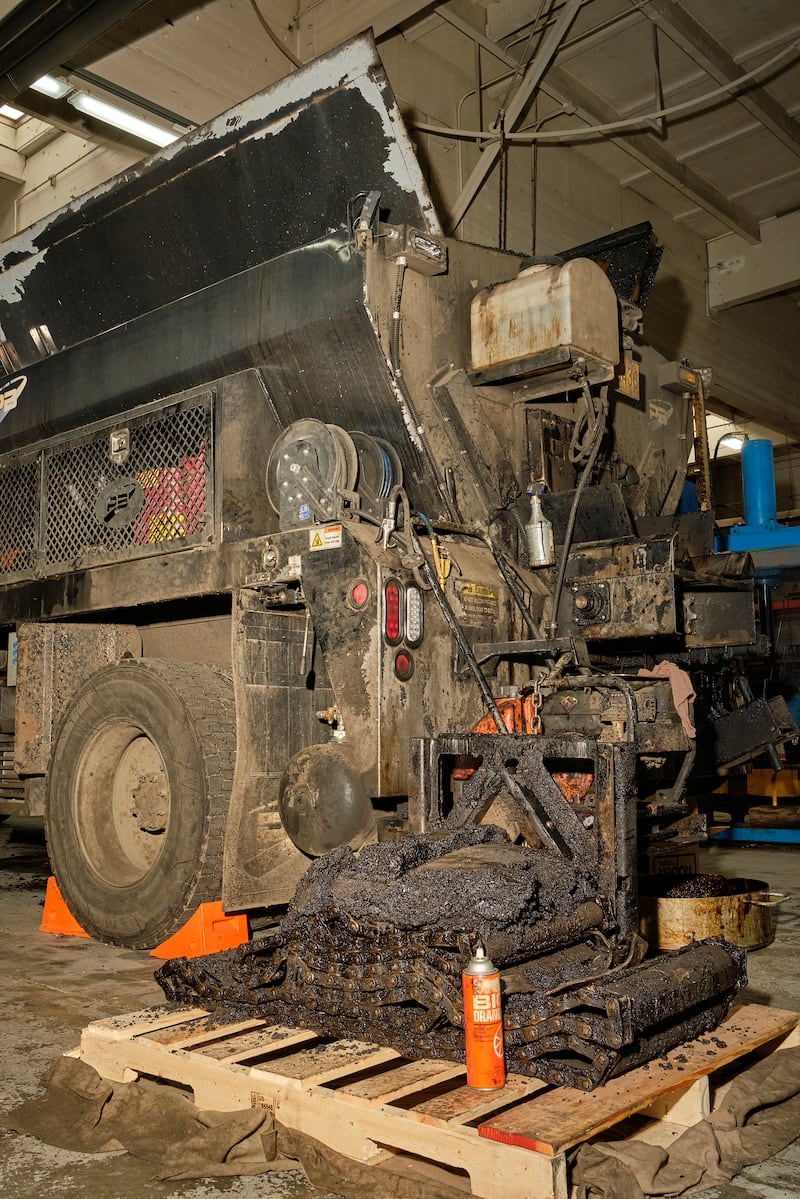
In reports to the Portland City Council about which of the city’s assets are the most degraded, the Kerby Garage is one of a handful placed in the category of “very poor condition.” It’s received similarly dismal reviews since 1971, when it became the fleet’s primary maintenance garage—more than 50 years ago.
“We don’t get noticed until there’s a snow and ice event. Then they remember us,” says Chris McMullin, a welder at the garage. “Being at the bottom of the totem pole, you get forgotten.”
That neglect stands in sharp contrast to the working conditions other city employees enjoy.
In 2017, the city launched a $214 million top-to-bottom renovation of the Portland Building, the Michael Graves-designed office tower where most city bureaucrats have desks.
Just as the building reopened, its workers fled home due to COVID-19. Two years later, when the mayor urged city office workers to come back, hundreds wrote in a letter that a return-to-office mandate would perpetuate policymaking practices that were racist, sexist and unfair.
Meanwhile, the 65 men and women of the Kerby Garage—one-third of them people of color—didn’t miss a day of work. They didn’t get hazard pay, and they weren’t allowed to reduce their hours.
“There’s this caste system in the city,” said Maty Sauter, the city’s manager of the Division of Aasset Management, at a recent hearing where she confronted city commissioners with the garage’s condition.
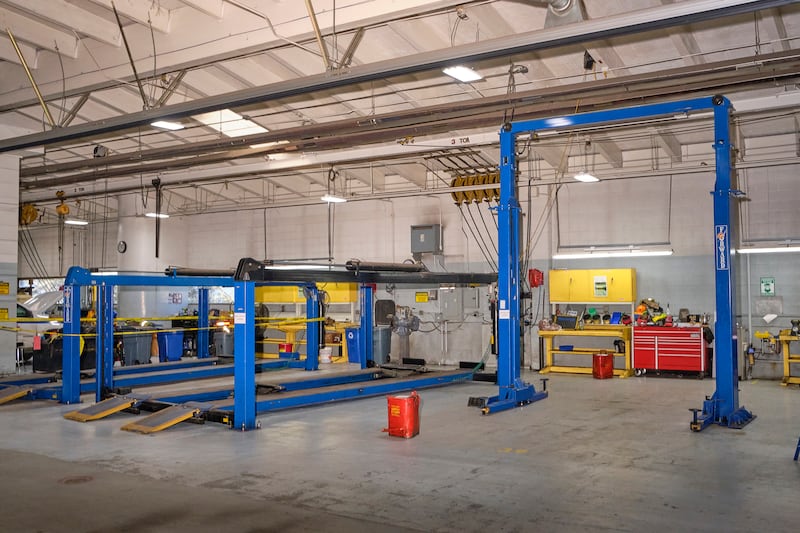
Seven times since 1971, according to a box of yellowed city archives, city staff has explored and encouraged bureau managers, directors and even elected officials to either renovate, build anew or move the Kerby Garage elsewhere so its workers would be safer.
Seven times, the idea has died somewhere within City Hall; it’s unclear whether any of the proposals ever came to a vote before the City Council. Such proposals have languished under the leadership of mayors as disparate as Neil Goldschmidt, Bud Clark and Ted Wheeler.
The cost of replacing the existing Kerby Garage has ballooned to the degree that city officials say it’s difficult to calculate. (It would cost $43 million just to replace the roof and perform other essential repairs.) It would be cheaper to build a new structure elsewhere, or to rent an industrial warehouse—and city officials could choose between those two options this summer. They could also do nothing at all.
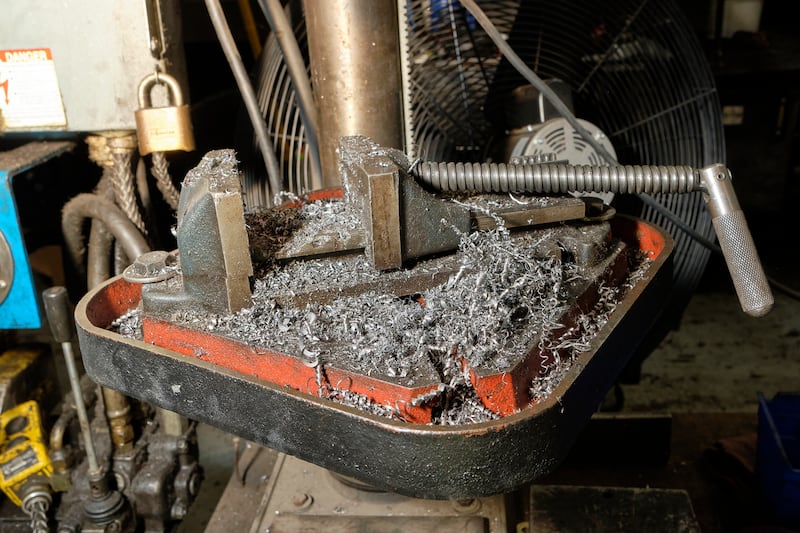
The condition of the Kerby Garage is just one tale among many of City Hall ignoring its assets until they’re too broken to salvage, but it’s an instructive one. Generations of elected officials have chosen to fund services that are more politically popular, like new parks, rather than improve working conditions for the blue-collar employees who repair $100,000 lawnmowers and bucket trucks used by the parks bureau to maintain those parks.
“I would say that that is one of the weaknesses that is baked into democracy,” says Commissioner Mingus Mapps, who oversees the Portland Bureau of Transportation. “If you don’t have a champion to make your case, as is the case with the Kerby, it’s going to be neglected.”
This spring, WW spent several days at the garage meeting the people City Hall has long chosen to ignore.
It’s 8 am, and Bell is working on a list of 27 repairs and inspections on a 10-wheel dump truck owned by the Portland Bureau of Transportation.
Changing out the tires alone is slow work—the tire bay is across the garage from the repairs bay, so Bell rolls two wheels at a time, one on each side of his body, across the garage. Once he’s there, he uses a noisy Hunter TCX640 machine to strip the tire from each metal rim.
A woman from the parts department—it’s almost like an Ace Hardware inside the Kerby—wheels in fresh tires. Bell affixes the new tires to the metal rims.
The garage still feels sleepy, an entrance door occasionally rumbling open to let in another unwieldy vehicle. Guns N’ Roses’ “Sweet Child o’ Mine” plays near one of the repair bays. Classic rock and country are the two music genres preferred by most of the guys, Bell says. He prefers lo-fi hip-hop, which he listens to on headphones while he works.
Bell, 35, is quiet and friendly, with big eyes. Once he cracks a smile, it seems to linger there for minutes afterward.
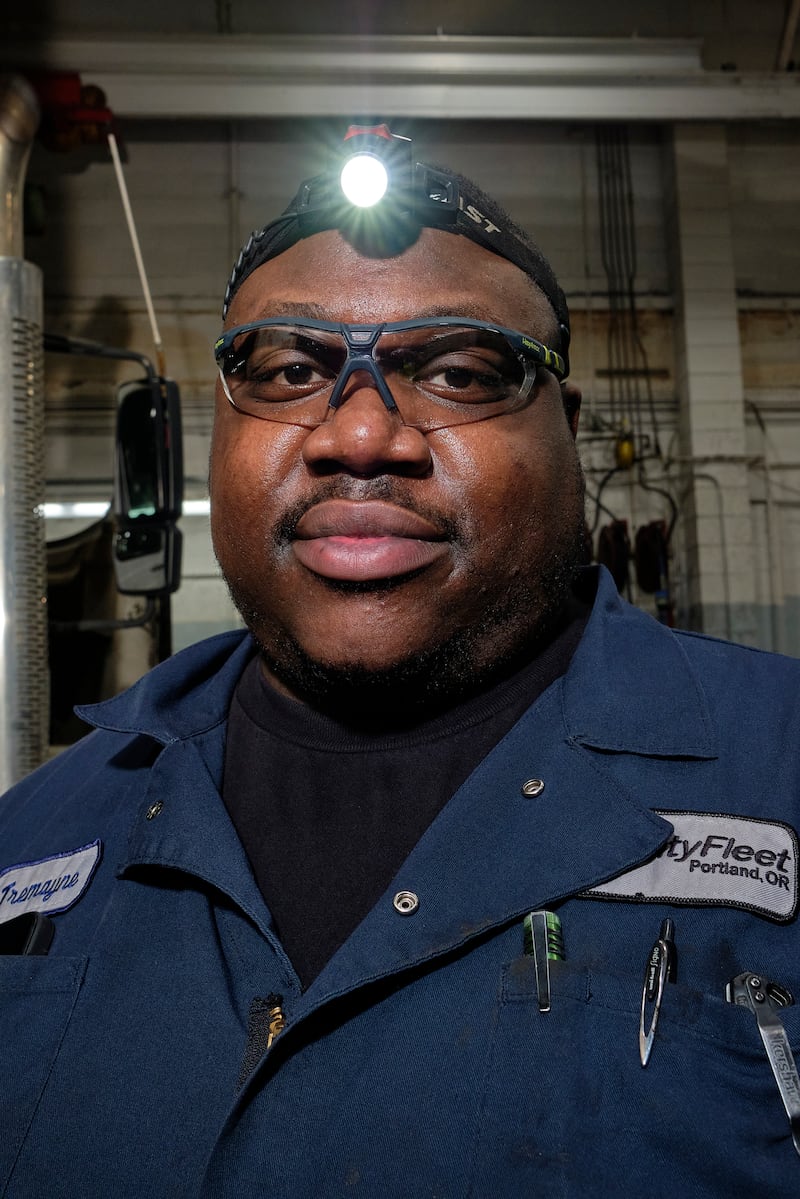
He grew up just blocks away, the son of a nursing home assistant and a father, from Nigeria, who jumped from one temp job to another. He’d always been fascinated, even at a young age, by how things worked.
When he was in middle school, he and two friends snuck into a Kerby parking lot filled with decommissioned vehicles and found fire extinguishers in unlocked cop cars. They chased each other around, spraying fire suppressant. Cops caught them and drove them home; Bell says he never played the fire extinguisher game again.
Out of high school, he, too, began working temp jobs: cleaning garbage cans, and a graveyard shift at a Northeast Portland gas station frequented by drunks.
“That’s when I finally decided to put my head on straight,” Bell recalls. “I’d just had my first child, and working at a gas station wasn’t working anymore.”
He earned his mechanical degree at Portland Community College. He got a bachelor’s degree in applied science with a major in diesel technology in Montana and worked as a mechanic at a car dealership. In 2017, Bell began working at the Kerby. He’s been there ever since. His co-workers say he’s one of the most meticulous mechanics on the floor.
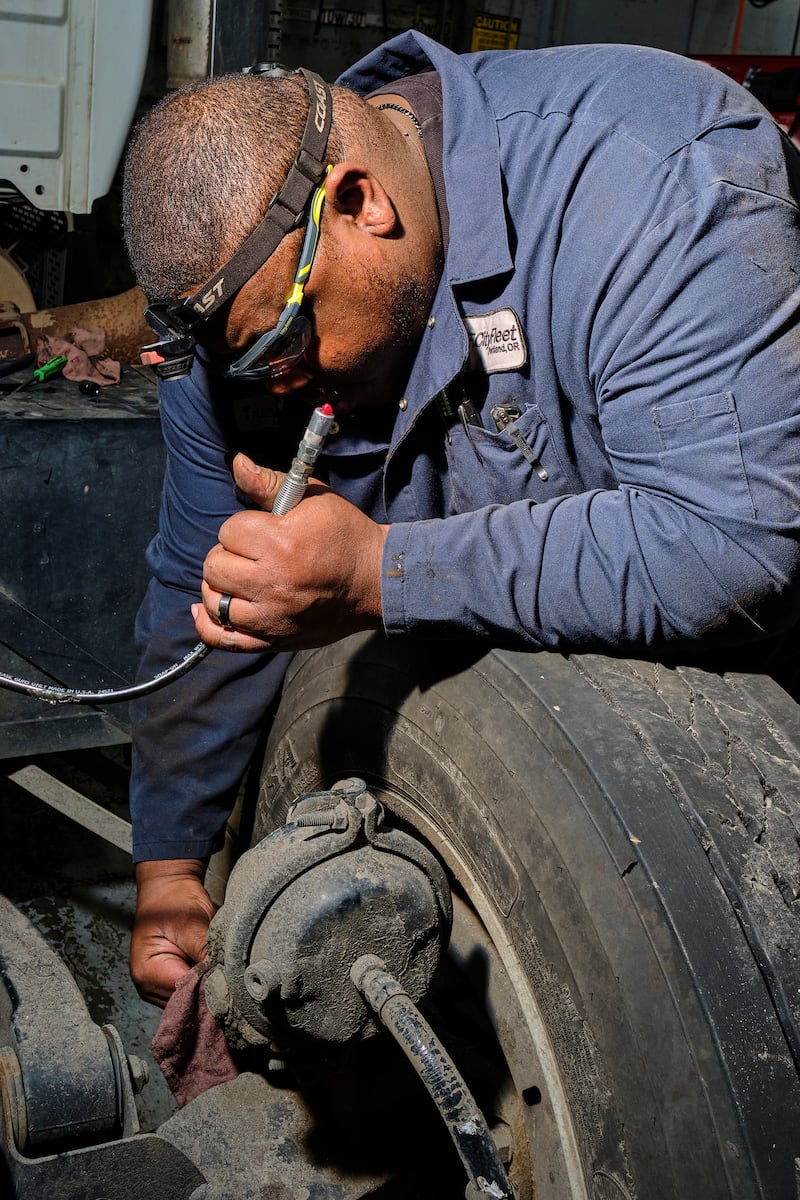
Over pineapple and peanuts in the upstairs break room (where three of the five microwave ovens are broken), Bell talks about the inefficiencies of the garage. He and other mechanics could talk for hours about how this garage—its lack of space, its sloped floors—slows them down.
So when the city’s new asset manager came in five years ago and promised to help, Bell wasn’t impressed.
“We were like, ‘We’ve heard this many times before,’” Bell recalls.
This time, however, Bell says, it was true.
The Kerby Garage services 2,400 of the city’s 3,800 vehicles. They include 336 police cars, 17 sewer suckers, and 90 pieces of snow equipment, including deicers, sanders and plows.
The city’s fleet has grown 270% since 1971, but the Kerby has remained the same size. The garage’s second story can’t support snowplows, dump trucks and excavators—they might crash through the floor and crush the Transportation Bureau workers below—so those vehicles all get squeezed into the lower-level repair bay, which is just under 30,000 square feet.
A 1976 report on the Kerby laid out issues that current reports echo, since little has changed since: “Practically none of the existing facilities were designed to suit vehicular-based operations.”
Part of the reason, Kerby workers have long surmised, is that they’re invisible to the public. The public sees deicers make streets passable during ice storms, but they don’t see the mechanics replacing tires torn up by the icy roads. So replacing the Kerby has never been politically popular.
And then Maty Sauter got pissed off.
It was 2020, when most city employees went home because of COVID, but Kerby mechanics couldn’t get time off, or hazard pay, because the Kerby billed bureaus for hourly labor at the time. “That’s when my mind exploded,” Sauter recalls. “This idea that some city workers would have deadlier working conditions than others, to me, is really morally appalling.”
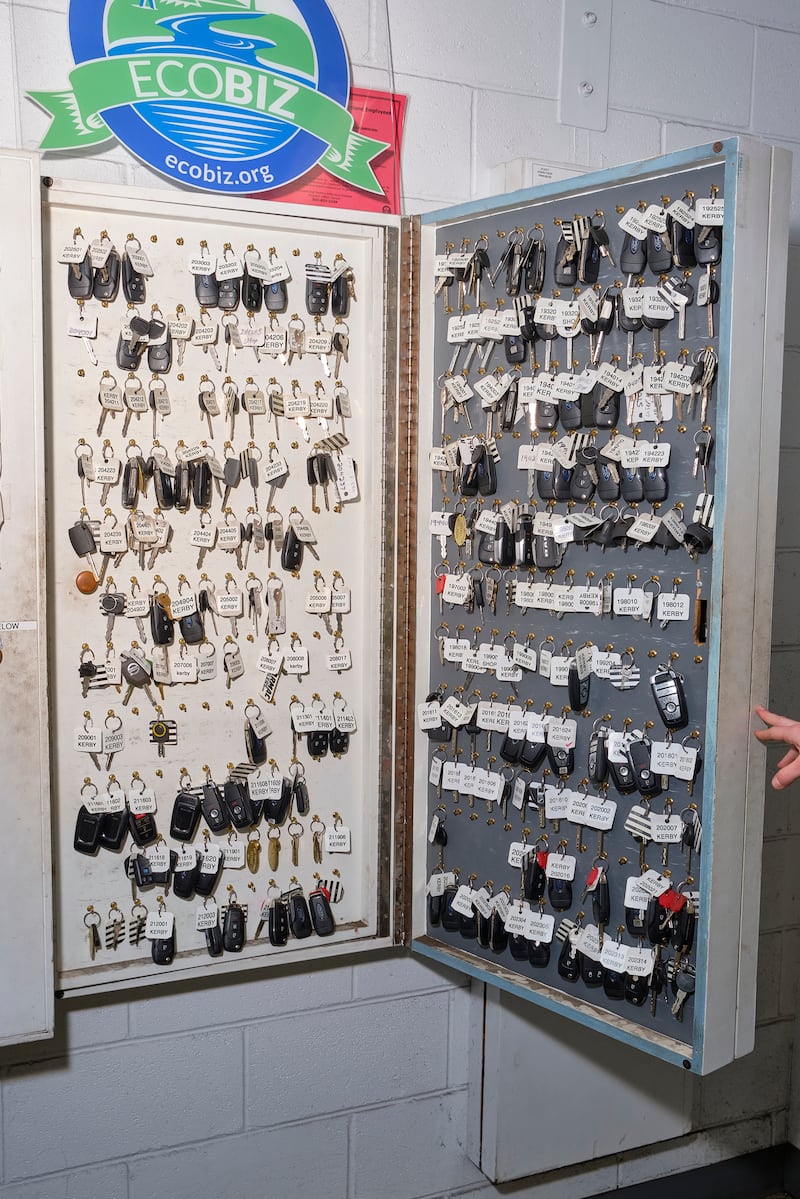
Sauter grew up in Iowa on food stamps as a young child, the daughter of an art supply seller and a horticulture professor.
She went to Reed College on a partial need-based scholarship. Smart as a whip, though she would hesitate to admit it, she worked after graduation as a bike courier in downtown Portland. She loved it.
“And then I got hit by a dump truck,” Sauter says, “and that’s when I thought, maybe I should do something different.”
Despite majoring in history, Sauter found jobs in infrastructure planning. She spent seven years at Portland General Electric, building out a program by which the utility could prioritize investments in its power grid.
Sauter applied to be manager of the city of Portland’s asset management division, a job for which she says she was woefully underqualified but which the city was desperate to fill. She got it. “It was a pretty big mess,” Sauter says, “and I was told that before I started.”
She kept hounding city officials about crumbling infrastructure as she oversaw $1 billion of the city’s physical assets. But she still felt more comfortable at the Kerby Garage than she did at City Hall.
“I didn’t know any rich people growing up. I knew smart people, but I didn’t know chichi people,” Sauter says. “I’ve had to learn how to work with people that are fancier, but that is not my world.”
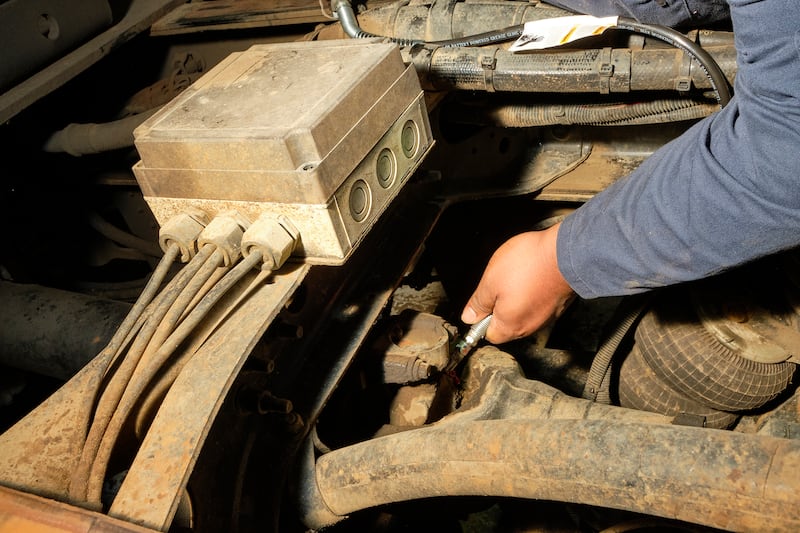
Sauter routinely prodded bureaus to help pay for a new Kerby, or at least a relocation, but the idea was always met with midlevel bureaucratic resistance.
But in 2020, Sauter and her boss at the time got more aggressive, exploring leases, renovation, and repair cost studies for the Kerby. In the spring of 2022, they proposed a $120 million relocation project, a proposal shot down by the City Budget Office, which wrote that it “has not been sufficiently vetted for bureaus and council.”
In the fall of 2023, Sauter began frequently meeting with city commissioners over a contentious relocation of City Council offices. She built relationships with them—just in the nick of time as the Kerby Garage’s roof began leaking tar.
At a Feb. 15 City Council meeting, Sauter once again asked commissioners, this time less patiently, to fund a new Kerby.
“We’re not asking for the Taj Mahal,” Sauter told the council. “We’re asking for a functional facility.”
“Maty’s our Patrick Swayze,” jokes welder Chris McMullin. “She came along and said, ‘Nobody puts baby in a corner.’”
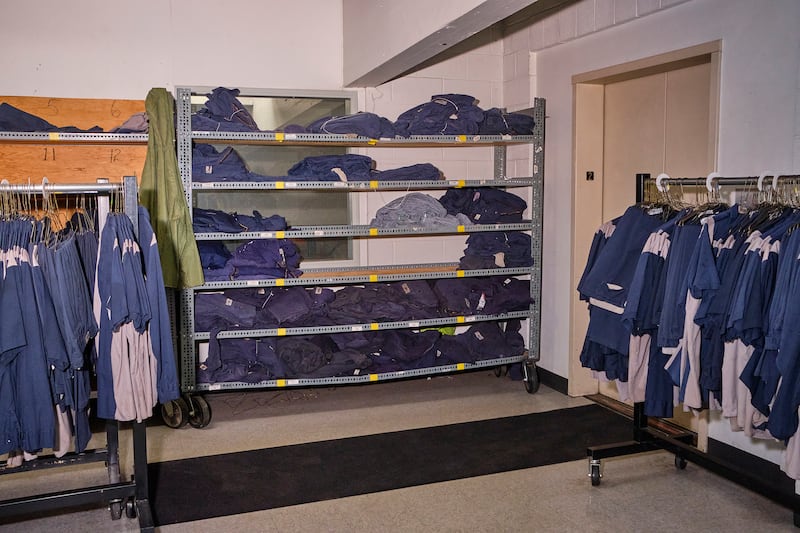
The number on a placard in the Kerby’s office celebrating Alex Martinez’s 25 years of service at the garage is covered with a piece of tape that reads, in black Sharpie, “28.” Every year, someone just adds a new piece of tape.
Martinez is the equipment coordinator at the Kerby but started as a mechanic. One of his two computer screens in a cramped office shows a map of Portland with green and blue dots tracking the location of each city vehicle in real time.
Three sewer trucks are clustered by an elementary school in Northeast Portland—probably fixing a broken sewer pipe.
He fields a call from the Portland Water Bureau requesting a jump start for a vehicle whose battery has died. Martinez sends a mechanic to make repairs in the field. Already this morning he sent another mechanic to jump-start a vehicle, and one for a busted headlight.
Martinez grew up in Southeast Portland after moving there from Chile with his family at age 9 (“I always tell people, I’m more American than Chilean”). He was the kid in the neighborhood who fixed all his friends’ bikes.
“It was easy, really,” he says of the two-wheelers.
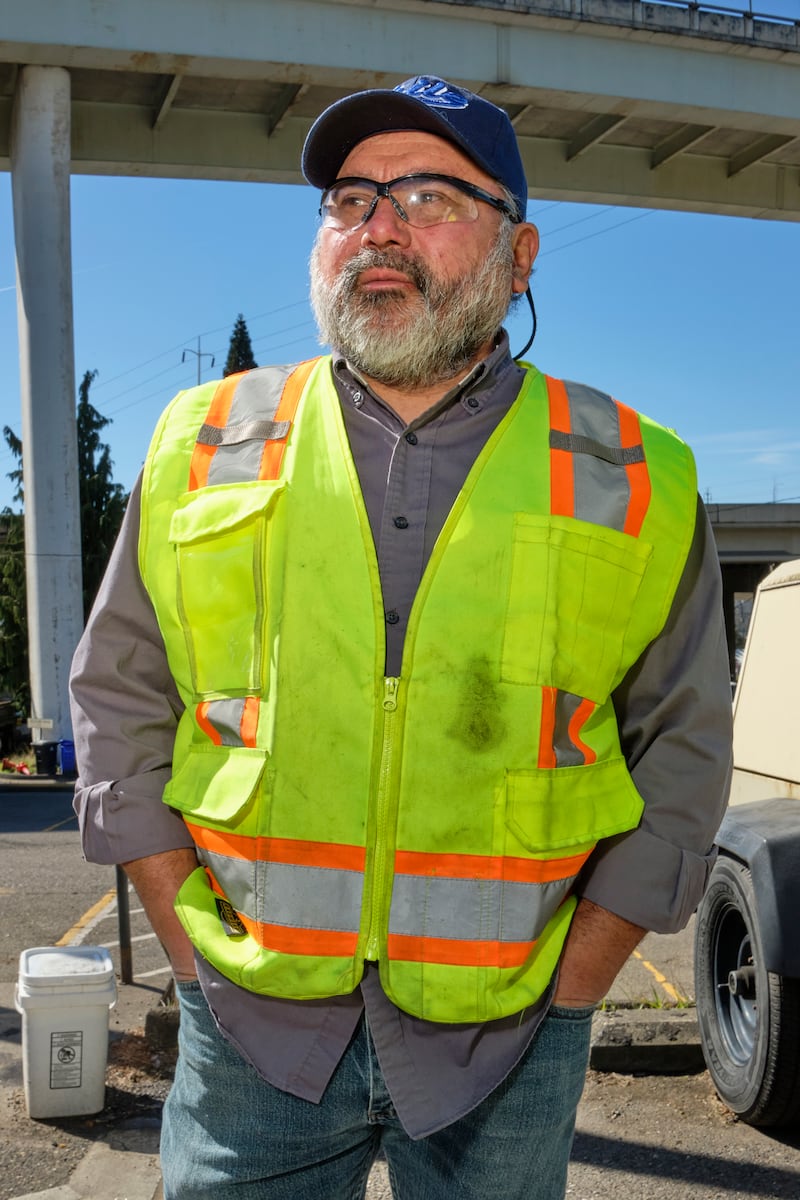
He started working right out of high school, rebuilding air compressors. In 1995, then in his 20s, Martinez saw a newspaper ad for city mechanical training at the Kerby.
Martinez remembers as far back as 1995, his first year at the Kerby, hearing that management was close to securing a new facility. Even then, the Kerby was inadequate to meet the bureaus’ demands.
He soon came to expect the same thing: Managers said they were getting close, but really, they were never that close at all.
“We’re out of sight, out of mind,” Martinez says. “All these years, they haven’t done nothing.”
But Martinez, a positive guy, is far more concerned about making the place work a little better, a little faster.
In fact, he says, the Kerby’s not such a bad place to work. He thinks he’ll probably retire here, in the same unchanged garage where he started his career 28 years ago.
At the Feb. 15 City Council meeting, Sauter walked commissioners through a new possibility: a 23-year lease option costing $53 million in upfront capital investments with a 20-year debt paydown period. The lease itself would cost $1.1 million a year on top of that, with two 10-year renewal options.
City bureaus would fund the new garage by paying higher repair rates for each city vehicle. The public works bureaus would bear the brunt of the cost, paying an additional $4.3 million a year.
It’s difficult to compare that figure to the cost of renovating the existing Kerby, because no one has calculated the full price tag. Renovation of the current Kerby would cost $43 million, but seismic upgrades and temporary relocation while work is done would tack on tens of millions more. Building a new garage elsewhere would cost $140 million.
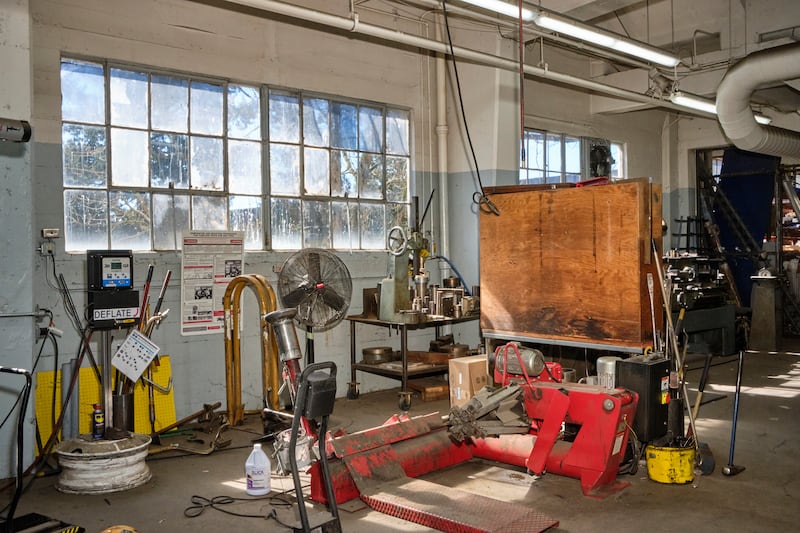
In a 20-page executive memo to the City Council on Feb. 7, Sauter wrote sternly about the city’s financial management.
“Although traditional wisdom suggests that owning is always better than leasing, the City does not have a strong track record of investing the annual capital maintenance that facilities require to stay safe and operational after they are built,” Sauter wrote, adding that twice since 2020 the city has declined to pursue an option to build a new garage even though, in the long term, it would “actually be more cost-effective.”
Commissioners promised nothing Feb. 15, but did say they supported exploring the lease further.
Sauter’s persistence seemed to have worked.
On Feb. 29, the Office of Management & Finance signed a binding letter of agreement that obligates the city to pay $25,000 a month in holding fees while negotiating lease terms with the 88,000-square-foot warehouse’s owner: former beer distribution mogul Ed Maletis.
The city has until June 30 to sign a lease.
Dr. Julia Freybote, an associate professor of finance and real estate at Portland State University, says there are pros and cons to government agencies leasing property.
“The city doesn’t have to worry about managing properties anymore,” Freybote says, but there’s also a flip side: “A disadvantage of leasing is the dependence on landlords and commercial real estate markets, which introduces uncertainty about future rental rates.”
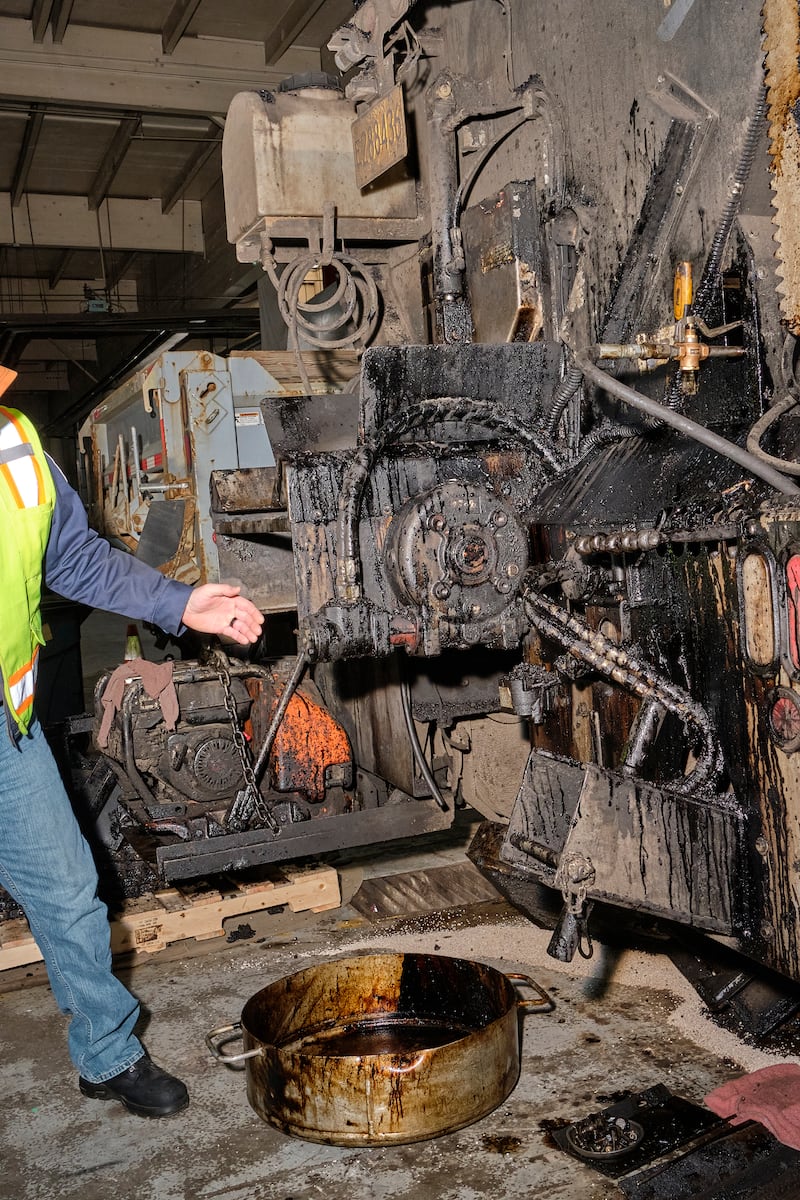
The more assets degrade, the more expensive they become to fix or replace, placing the city in the position of having to lease other people’s properties because officials for so long neglected their own.
“Traditionally, we think owning is better than renting, but the city hasn’t demonstrated good discipline in maintenance,” Sauter said at the Feb. 15 City Council meeting. “The only answer is to start doing targeted, long-term leasing.”
In that meeting, Mayor Ted Wheeler reflected on the Kerby’s long-standing political predicament.
“There is no political advantage for an elected body to invest in capital maintenance, and there never has been—and that’s why, for 50 years, this project has been put forth,” Wheeler said. “And it’s been ignored.”
When WW asked what responsibility Wheeler thought he bore for the city turning to leasing, he declined to answer. The mayor said he was “generally supportive” of the lease option but would not say whether he’d vote for it when it comes before the City Council.
At least one worker at the Kerby Garage is moving out now.
On a Wednesday afternoon, the Kerby is throwing a going-away party for a supervisor named Kevin, who started as a mechanic there 11 years ago and moved up to eventually manage more than 20 mechanics. Kevin is going to work on Columbia County’s much smaller fleet.
Kevin is not one for sentimentality, and as mechanics sit in folding chairs all facing the front of the drab upstairs training room, Kevin looks down at the floor, thumbs hooked through the belt loops on his pants, quiet. One at a time, in no particular order, mechanics and supervisors thank him.
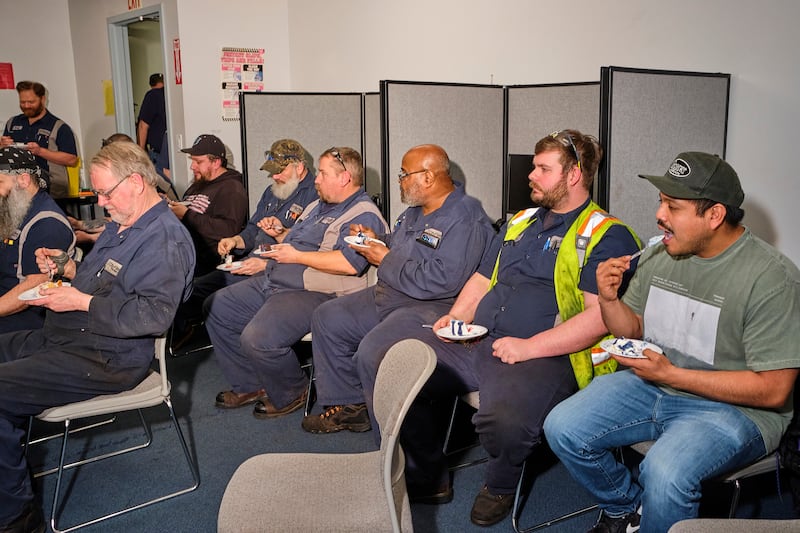
Embarrassed, Kevin asks for funny stories instead—unleashing a wave of tales about how the quietest guy in the shop is also one of the most mischievous. He still looks at the floor, but this time with a slight smile.
Eric Chitoubol, the garage operations manager, hands Kevin a frame. In it is one of Kevin’s navy Kerby uniform shirts, signed by all the mechanics in silver Sharpie.
Kevin can’t stop staring at it.
“It’s pretty emotional,” he says quietly.
After slices of a blue-and-white-frosted cake, the mechanics file back out to work on their vehicles.
